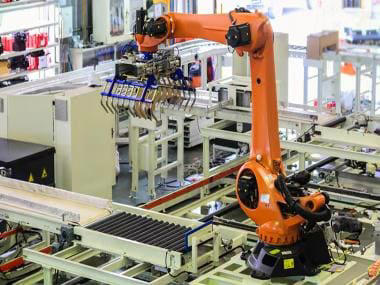Nabila El-Gaafary
Egypt - Cairo
28 November, 2023

Starbucks Egypt has recently suffered declining sales triggered by boycott campaigns [Getty]
advertisement
Starbucks Egypt has allegedly laid off scores of workers after a boycott campaign of the coffee chain, amid the deadly offensive on Palestinians in the Gaza Strip, reportedly leading to losses for the company.
Starbucks is believed to have been financially affected by the boycott in Egypt, which was fuelled by claims that the Seattle-founded coffee franchise provides support to Israel, something that the company has repeatedly denied.
Starbucks has not operated a franchise in Israel since 2003 but has been a target of boycott campaigns for the MENA region, partly because its former CEO, Howard Schultz, is an outspoken supporter of Israel.
One employee told The New Arab, on condition of anonymity due to fears over their job, that "the company had informed several employees and workers they would be discharged due to a substantial decline in sales attributed to the ongoing boycott campaign".
The source did not provide any further details about the alleged financial losses or how many staff had been released.
"Currently, they cut down expenses... and forced the remaining workers to do more work than they were supposed to in order to compensate for the shortage of staff," he said.
Why Sinai is so sensitive in Egypt-Israel ties
The Egyptian Centre for Economic and Social Rights (ECESR) condemned the reported layoffs in a statement this week, offering free legal support and advisory services for the sacked workers and arguing that the company had violated Egyptian labour law.
"Egyptian labour law stipulates that in case an employer wishes to reduce the workforce for financial reasons, the company is legally required to submit a request for downsizing the establishment… before a committee [at the labour bureau] formed especially for this purpose," the union said.
"The request in this case must include justifications for downsizing the staff and the number and categories of workers to be laid off."
Starbucks is not on an official Boycott, Divestment, Sanctions (BDS) boycott list but the company has been engaged in a dispute with a US labour union over workers' support for Palestine.
Some argue that the popular boycott of Starbucks has inflicted losses on Egypt’s already ailing national economy as many of the products sold at the chain, especially food and beverages, are locally sourced.
Egyptians are boycotting other Western brands over perceived links with Israel with some restaurants and outlets offering special offers and discounts to entice customers.
McDonald's Egypt currently offers an average-sized coffee for 20 Egyptian pounds ($0.65) and its famous ice cream cone for half this price.
When calling the hotline of McDonald’s Egypt to order a meal for home delivery, a caller will hear a recorded promotional message saying that the company uses 100 percent Egyptian products and raw materials, and employs only a local workforce, in what appears to be an attempt to show their connection to the local economy.
McDonald's Israeli franchise, however, began offering free meals to Israeli soldiers after Hamas's 7 October attack on Israel and this was widely reported across the Arab world. McDonald's franchises in Arab countries were quick to distance themselves from their Israeli counterpart.
A report released by Reuters last week cited a source at McDonald's Egypt as saying that the local branch had experienced a 70 percent drop in sales last month, compared to the same period last year.
The New Arab has reached out to Starbucks for comment, but received no response by the time of publication.









